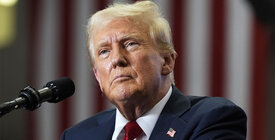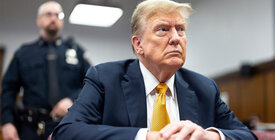Last week, just after the one-year anniversary of Donald Trump’s federal indictment in DC for interfering in the 2020 election, Judge Tanya Chutkan’s jurisdiction over the case was restored. Following the Supreme Court’s stunning decision establishing broad presidential immunity for official acts, the case was returned to her with instructions from the Court of Appeals to conduct “further proceedings consistent with the Supreme Court’s opinion.”
On Saturday, Chutkan went to work, entering a series of decisions and ordering the parties to jointly file a written status report in a week and join her in court for a status conference the week after that.
Special Counsel Jack Smith’s cases in both DC and Florida now face serious challenges. What should we expect him to do?
Keep in mind that Smith was dealt a bad hand — two of them actually. In the classified documents case in Florida he drew Aileen Cannon, a judge who was at best inexperienced and at worst biased. After toying with this fairly straightforward case for over a year, she dismissed it, finding Smith’s appointment was unconstitutional — a ruling at odds with mountains of precedent that stretches back decades.
It will be some time, if ever, before the 11th Circuit Court of Appeals decides how the Supreme Court’s immunity decision affects the classified documents case, because it must first deal with Cannon’s dismissal on other grounds. It shouldn’t affect it at all, really, since all of the conduct occurred after Trump left office; he is charged with retention of government documents, not theft. But Trump’s lawyers may well try their luck, hoping the court will stretch the immunity decision even further to protect the former president.
In the election interference case in DC, Smith hit a roadblock when the Supreme Court agreed to take up Trump’s presidential immunity and then delayed its decision until the very last day of the court’s term. It’s now virtually impossible for a trial to take place in either case before the election. And the high court’s ruling on immunity, when it finally came, was a bombshell: a broad grant of immunity to former presidents for any official acts taken while in office and a prohibition against even using evidence of those acts to prove unofficial acts charged as crimes by prosecutors.
In a sense, Smith hasn’t made much progress. He’s back at square one, forced to reconsider the charges and allegations in his indictment and the evidence he can use to support them.
The Supreme Court’s decision on the broad scope of immunity from criminal acts granted to former presidents provoked disgust among some legal scholars, animated by hypotheticals like the one Justice Sonia Sotomayor used — that the majority’s opinion would permit a president to walk away after using SEAL Team Six to take out a rival. It led to the introduction of the “No Kings Act” by Senate Majority Leader Chuck Schumer (NY) to make clear what everyone, including his colleague, Senate Minority Leader Mitch McConnell (KY), had always previously assumed to be the case — that presidents are not kings and can be prosecuted for their crimes just like the everyone else.
Different prosecutors may land on different strategies in the same case. But when it comes to the fundamentals, all prosecutors follow the same rules: the Federal Principles of Prosecution. Smith will too.
The principles are guidelines federal prosecutors use to decide whether to bring an indictment. They are part of what is now called the Justice Manual, previously the United States Attorneys’ Manual. Before indicting, a prosecutor must believe she can “obtain” and “sustain” a conviction. In other words, she must believe the evidence is sufficient to obtain a plea or guilty verdict in the trial court and have that verdict sustained on appeal. There are other considerations as well, but this is the threshold requirement.
Here, Trump has already been indicted, but following the Supreme Court’s decision on immunity, Smith’s team may choose to — or be ordered by the court to — alter or delete some of the four crimes Trump is charged with committing, the allegations they make in the indictment to support those crimes, and the evidence they intend to offer at trial to prove them. To proceed, Smith must be satisfied that he will still have sufficient evidence to convict on any charges that survive the Supreme Court’s decision and that he is on sound ground legally so any conviction he obtains can be sustained on appeal. When prosecutors have evidence suppressed or lose legal arguments, they act accordingly and voluntarily dismiss some counts in an indictment or even the entire case where appropriate. In this sense, Smith’s next steps as he recalibrates after the Supreme Court’s decision will be guided by the Principles of Prosecution. And the election interference case will be like any other.
Keeping the principles in mind, there are a series of decisions Smith needs to make now that Chutkan has resumed proceedings:
A slimmed-down indictment?
Chief among these decisions for Smith is whether he should “slim down” the indictment, removing charges and allegations he believes could be vulnerable without waiting for the court to do so. He could make a motion to take out any material the government no longer wants to pursue. Some people have suggested that would be a quick way to get the case moving again.
But negotiating with himself is not a good strategy for Smith. Instead, when the parties file their joint statement with the court, he should insist, whether Trump agrees or not, on having the court review the charges and evidence and decide what prosecutors can move forward with. Smith should ask the judge to go through the indictment charge by charge and allegation by allegation. Trump should be required to establish why he is entitled to immunity for any particulars he believes should be excluded. Prosecutors should be permitted to argue — as the Supreme Court said they could — that some conduct is the type of official act entitled only to presumptive immunity and that the government can overcome it by showing that charging that conduct as a crime or using it as evidence will not interfere with the functioning of the presidency.
Ultimately, the judge should evaluate the arguments and make her calls in an order that will create a strong record that can be used to support the position that any charge or evidence Chutkan permits the government to use fell outside of presidential immunity. The Supreme Court left most of this up to her, suggesting only that Trump’s activity with Justice Department officials was absolutely immune. Smith should call on the judge to carefully scrutinize all else and engage in a painstaking decision process, knowing that the issue is inevitably headed back to the appellate courts and a clear, solid record supporting his case will be critical.
In fact, Chutkan may be anticipating a process like this. In her memorandum opinion denying Trump’s selective and vindictive prosecution motion on Saturday, she revisited each of the four charges against Trump, carefully specifying the paragraphs in the indictment that pertained to each of them. It would come as no surprise for her to have done that in preparation for just this type of exacting review.
Need for speed?
Trump will attempt an interlocutory appeal — that is, an appeal before the trial — of Chutkan’s decisions on this matter, again. As the Supreme Court explained, the entire point of the protection immunity offers is that it prevents the holder of immunity from being tried at all. The benefits of that immunity are lost if a court wrongfully permits a case to go to trial, so a former president asserting the immunity is entitled to take an appeal in advance of trial to resolve the issue. Once Chutkan rules, expect that this case will be off to the Supreme Court again.
Given this, it makes sense for Smith to take the time to build a strong record to support each charge and allegation he believes is made on the basis of unofficial acts or presumptively official acts where he can overcome the presumption of immunity. Insistence on going quickly doesn’t make sense; the case is not going to trial until the appellate courts get at least one more crack at it. Here, getting it right is more important than going fast. Getting it wrong would mean losing any conviction obtained at trial on appeal and it’s not happening before the election in any event.
Evidentiary issues
There is a mountain of evidence in this trial. The job of sorting it out piece by piece to determine admissibility in light of the immunity decision is an enormous task. In the typical case, some calls about the admissibility of evidence — for instance, purely legal issues such as whether evidence was legally obtained pursuant to a valid search warrant — are made by the judge before trial. Others are made during trial. Whether evidence is barred by immunity is a legal issue that should be decided in advance of trial akin to search and seizure issues, and Smith should ask the judge for upfront rulings on how the new immunity rules impact admissibility, so he has some level of certainty about what evidence he will be able to use. This may be in Trump’s best interest too, in order to tee up his second round of appeal.
But the evidentiary issues in this case are far more complicated than the typical situation in which a defendant wants drugs or a gun seized during a search suppressed. Cases like that involve a discrete piece of evidence, or perhaps a few items. Here, expect Trump to go line by line through the indictment and push to exclude it all. That process could make for some interesting court proceedings, whether strictly in pleadings or including hearings as well!
The bottom line
The most important strategy for Smith is implicit in the duality presented in the Federal Principles of Prosecution. He must protect both his ability to get a conviction and his ability to get it affirmed on appeal. Both of those items put him in a highly unusual situation, presenting both novel legal issues and complicated factual inquiries into voluminous allegations and evidence. Smith must be aggressive, but not unduly so, ensuring he can successfully defend any wins he gets from Chutkan on appeal.
The Principles of Prosecution admonish federal prosecutors that, “Important though these principles are to the proper operation of our federal prosecutorial system, the success of that system must rely ultimately on the character, integrity, sensitivity, and competence of those men and women who are selected to represent the public interest in the federal criminal justice process. It is with their help that these principles have been prepared, and it is with their efforts that the purposes of these principles will be achieved.” Those words have never mattered more than they do in this case. The loyalty of prosecutors to the rule of law is the country’s path forward.
On Friday, the first step necessary to get the election interference case back underway will take place. The parties will file a joint submission proposing a schedule for pretrial proceedings moving forward. It’s a routine step in most cases, setting the calendar. Here, it has much greater significance and is our first opportunity to get a look at Jack Smith’s strategy for getting his case back on track.







